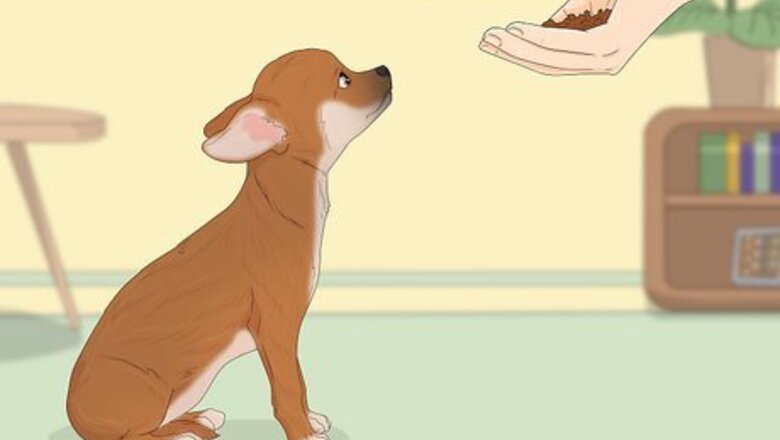
views
Mastering the Basics
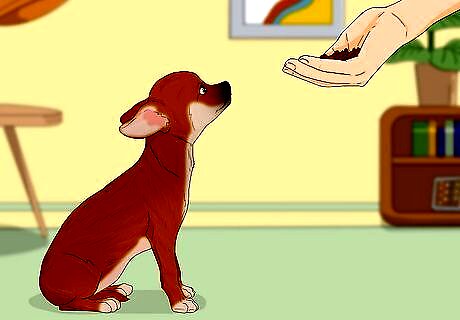
Use reward-based training. Dogs make a positive effort to repeat behaviors that get a reward. Thus if you ask a Chihuahua to "sit" and it rewarded when it does, it learns that doing something which comes naturally(sitting) can earn a tasty reward. The same applies to potty training. When the dog performs a natural bodily function in a specific spot (peeing or pooping) and gets a rewards, it then tries to save up its "efforts" to spend them on that designated spot in order to earn a super tasty treat. Reward-based training requires you to be on the spot when the desired behavior happens, which means you need to be home to take the dog to the toilet spot regularly. Find a treat that your Chihuahua loves and adores, and will work hard to earn. Try a range of foods from commercial treats to chicken, cheese cubes, sausages, or hot dogs. If your dog has health issues always check in with your veterinarian first to make sure there is no health reason why it shouldn't have a certain food.
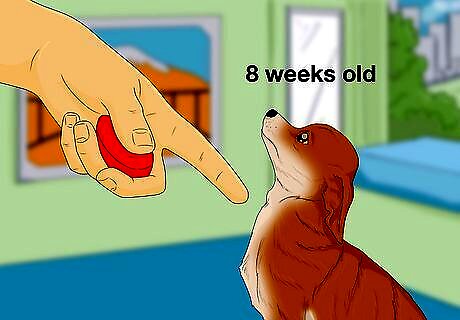
Start training your chihuahua when he or she is young. You can, and should, start training your dog at about 8 weeks. Training takes time, so start slowly and have patience. Remember that the older a Chihuahua gets, the harder it is to train them. So it will benefit you greatly to get started early.
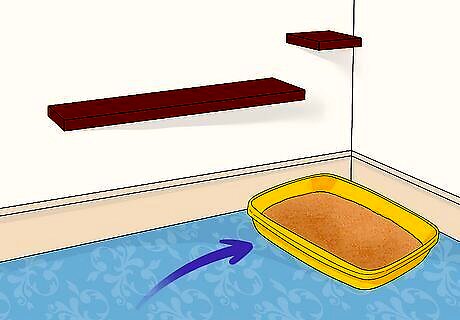
Decide on a specific bathroom spot from the time you bring your dog home. Decide where you want your Chihuahua to toilet. When bringing a puppy home, the first place you visit, before even setting foot indoors, is the toilet spot. Ignore the puppy's attempt to play and engage you so that he or she gets down to the business of sniffing around. If the puppy toilets, make a super big fuss of him or her and give a treat.
Developing a Routine
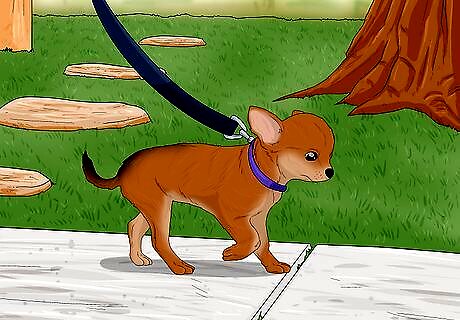
Take the dog out often. Give the Chihuahua (adult or puppy) plenty of chances to visit the toilet spot. Even if you have a dog flap, you need to be proactive and take the dog out and put him or her on the spot. The dog won't automatically know that's where you want it to go to the bathroom without being shown. For a puppy, take him or her out every 20 minutes when its awake. If the dog toilets, then be enthusiastic and give it a treat. If it doesn't toilet, bring him or her back inside and try again 20 minutes later, but keep an extra vigilant eye on it in the meantime. You want to spot if he or she attempts to squat indoors so you can scoop it up and take it outside. Crates are a great boon when house training because it acts as the dog's den and instinct makes it less likely to soil its den. However, do not crate for hours at a time. Remember the crate should be a dog's safe place not a prison, so alternate crating with play and time on the leash. For an adult Chi, take him or her out hourly. Set an alarm to remind you each hour.
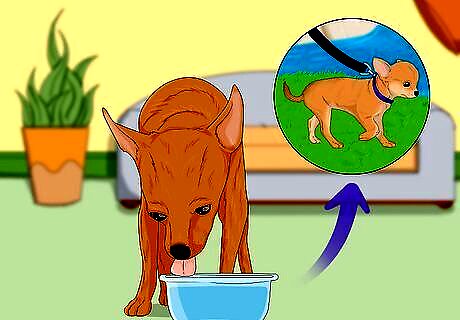
Take the dog out immediately after waking and after meals. Food in the stomach triggers a reflex that causes the dog to move its bowel around 15 - 30 minutes after eating. Make use of this reflex by popping the Chihuahua outside after meals and waiting with him or her until it performs. Do not leave the dog unattended at the toilet spot or you will miss the magic moment and lose the chance to reward it.
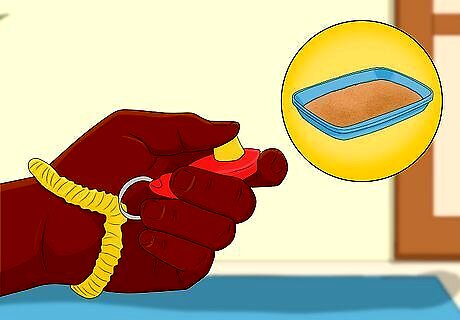
Teach your dog to go to the bathroom on command. Decide on a cue word such as "toilet" or "business" to use when training. Make sure all family members know and use the same word, otherwise your Chihuahua will get confused. Once your Chihuahua has finished going to the bathroom, be sure to praise it and give a treat. This helps him or her to associate going to the toilet with that specific area and makes it eager to return there. Activate a dog-training clicker while the dog is going to the bathroom. This makes a click-clack noise that gets associated with getting a reward. By making a click-clack whilst the dog is toileting, it marks the exact moment of the behavior you are committing to reward. Now say your cue word "Toilet." Each time the dog goes to the toilet, click-clack and "Toilet." Over time the dog will associate the cue word "Toilet" with the action of peeing or pooping and know it has done a good thing. The final step is to take the dog to the toilet spot and just say the cue word "toilet." The dog now knows you want him or her to defecate and will attempt to do so in order to earn a reward. If the dog doesn't try, then you have gone a step too far and will need to go back to waiting for him or her to go to the bathroom, click-clack, and say the cue word. Try the advanced stage again a few days later. This is especially handy when it's pouring with rain or freezing out.
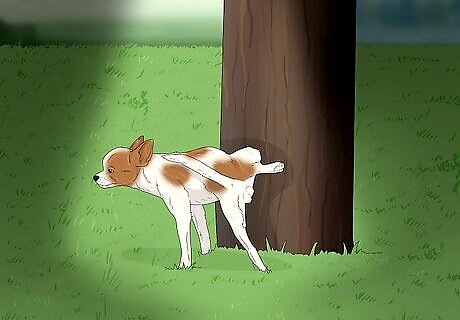
Let a puppy out throughout the night. A puppy cannot hold his or her bladder overnight and so should be offered a toilet break every 4 hours during the night. However, downplay removing the puppy from its crate and keep things low key so that he or she isn't rewarded with attention that would encourage wakefulness and play. Merely scoop the Chihuahua up and without speaking to it take it out to the toilet spot. The dog's bladder will be full so it should urinate. As soon as its finished bring it back in, pop it into its crate or bed, and settle back down to sleep yourself. All of this should be done without interacting so that he or she understands it's strictly toilet time and not play.
Avoiding Accidents
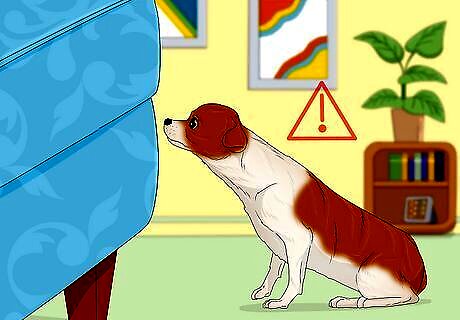
Keep an eye on Chihuahua in the house. For speedy training, be vigilant and spot signs that your Chihuahua needs to go to the bathroom and is thinking about toileting in the house. Watch for behavior such as sidling up to furniture and sniffing, or sniffing the carpet and maneuvering as if to squat. When you see that behavior immediately scoop the dog up and pop it outside on to the toilet spot. It can help to keep the Chihuahua on a leash in the house, so that it can't wander off to a quiet corner and indulge itself in a spot of illicit peeing. When it's not possible to be with the dog, put it into its crate. However, you need to be sure to observe the 20 minute toilet break rule for pups and 1 hour for adults. Your goal with potty training is teaching your dog how to ask to go outside. That way, you can confidently take them anywhere without an accident.
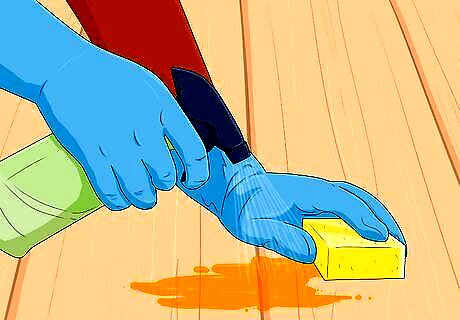
Deal with accidents gracefully. If despite everything your Chihuahua toilets in the house, never tell him or her off. All this teaches the dog is that you have an irrational dislike of its bodily functions. This could make the dog more devious (it will hide to go to the bathroom) and actually sets potty training back because the dog may become fearful to toilet in front of you, even on the designated spot. Instead, bite your tongue and wait for the Chihuahua to wander off. Then clean up thoroughly using an enzymatic cleaner. The enzymatic cleaner gets rid of all traces of urine or poo so there is no scent mark for him or her to return to. Do not use household cleaners containing bleach or ammonia, since these are components of urine and can amplify the scent and draw the dog back to that spot. If Chi has already established an inappropriate place to toilet then clean it up with enzymatic cleaner and put its food and water bowls there. Dogs do not foul where they eat, so this will help to break that habit.
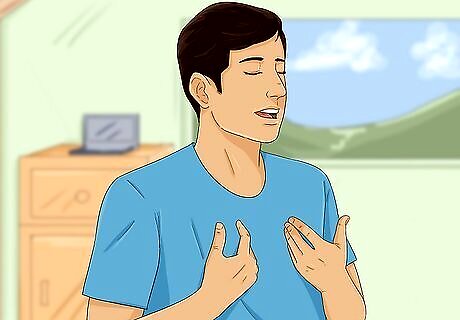
Remember to be patient. Do not be violent or shout at your chihuahua. Instead, be loving and supportive. Your chihuahua will need time to get potty trained. Just continue to be consistent and don't get angry if your dog doesn't go to the bathroom on command right away. If the dog goes potty where it's supposed to, remember to reward it with treats. This will help to reinforce the desired behavior. Don't change the potty place every week or else the dog will be confused. If the puppy goes in the wrong place, be gentle, don't be angry because it happens.
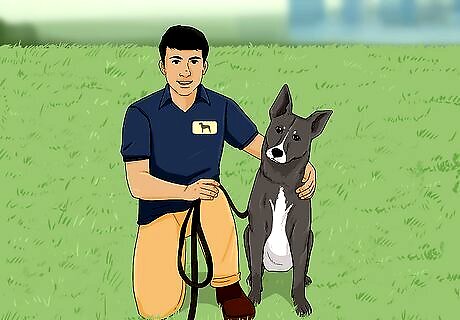
Contact a trainer. If potty training is not working and you have been at it for quite awhile, try contacting a trainer. Look for a training program that will work for both you and your dog. Getting professional help is the best option when in a position like this.











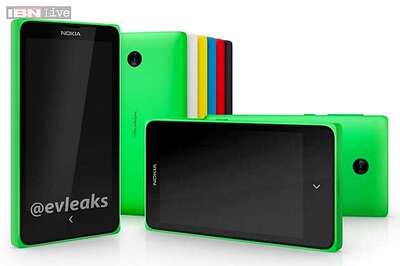


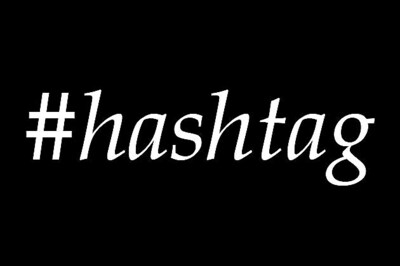
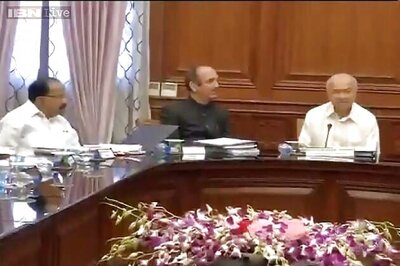


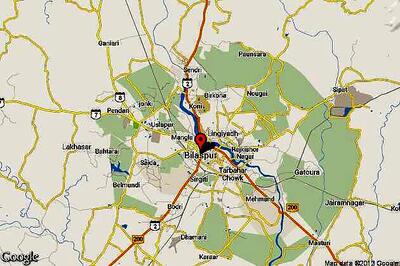

Comments
0 comment